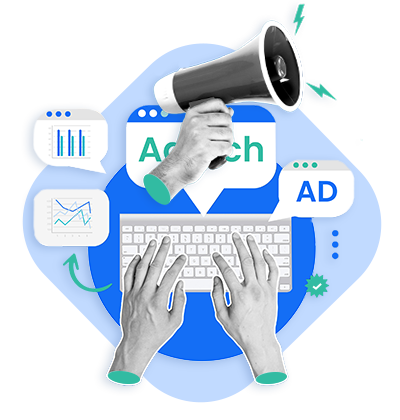Read More

Discover what’s next for AI in healthcare in 2026 - Get Access to the Full Report
On This Page
- Understanding AdTech
- How AdTech Software Works?
- Significant Features of a Successful AdTech Platform
- Benefits of AdTech Software Development
- Key Components of AdTech Solutions
- Types of AdTech Software Systems
- Real-Time Applications of AdTech Software
- How to Build an AdTech Platform?
- Challenges of AdTech Software Development
- Tech Stack for AdTech Software Development
- AdTech Software Development Cost Estimation
- The Future of AdTech Software Development
- Take the Next Step with Radixweb!
On This Page
- Understanding AdTech
- How AdTech Software Works?
- Significant Features of a Successful AdTech Platform
- Benefits of AdTech Software Development
- Key Components of AdTech Solutions
- Types of AdTech Software Systems
- Real-Time Applications of AdTech Software
- How to Build an AdTech Platform?
- Challenges of AdTech Software Development
- Tech Stack for AdTech Software Development
- AdTech Software Development Cost Estimation
- The Future of AdTech Software Development
- Take the Next Step with Radixweb!
What’s Inside? To meet the rising demands of the booming digital advertising market, businesses are turning towards developing impactful AdTech software solutions. This blog will give you a comprehensive idea on everything related to AdTech software and its development including the benefits, types, challenges, and more. Moreover, you’ll explore how Radixweb can help you convert impressions into sales in the $579.4 billion AdTech market.
In a world where consumer preferences keep on changing abruptly, attention spans fade away and traditional advertising approaches are no longer given heed, AdTech Software Development is not an option! It is a necessity!
This is an era where precision matters – getting the right audience, placing commercials at the best moment, and delivering messages that align with consumer perspectives. Whether you want mobile ad platform or audio streaming ad insertion solutions, partnering with a seasoned provider of sustainable, premium-quality software solutions can help grow your media sphere.
With the AdTech technology on the rise, you can expect it to value around USD 1,496.2 billion by 2030, registering a compound annual growth rate (CAGR) of 14.5%. Well, now is the perfect time to plunge into the domain of algorithms, analytics, and automation – the real keys to thrive in advertising. Find out how construction of AdTech software is empowering data-driven decision-making, thereby transforming advertisement campaigns to become more effective than ever in the dynamic field of advertising evolution.
Understanding the Fundamentals of AdTech
AdTech (Advertising Technology) is the dynamic intersection of advertising and technology. It refers to the collection of software and tools that scrutinize, supervise, and facilitate digital advertising campaigns.
Also know that the AdTech market has witnessed a considerable rise with the global-side CAGR value of 14.3% (2024-2033). All thanks to the large-scale digitalization of the advertising arena and the rising preference for data analytics driven marketing strategies.
Further, AdTech software is a wide spectrum of technology solutions used in the advertising sector enabling businesses to accurately target their audience, bid for ad space in an automated manner (programmatic advertising), measure ad performance, manage media buying across different channels, amongst other functions.
Moreover, the global market for AdTech software is bound to rise to a value of USD 1494.92 billion in 2030, from a mere count of USD 579.4 billion as registered in 2023. Such massive growth is contributed by factors such as emergence of new technologies and increased spending on digital advertising.
AdTech Software: How It Works?
AdTech software is a great facilitation of efficient media trading deals between advertisers (demand-side) and publishers (supply-side) through programmatic algorithms. Let’s understand how AdTech software works for advertisers and publishers -
- Demand-Side: Advertisers are interested in targeting their audience at the right price, which can be achieved through personalized programmatic campaigns, ad targeting and re-targeting. AdTech software helps the demand side to create a full-funnel marketing strategy.
- Supply-Side: Publishers on the supply side try to make bucks by launching ads on their digital assets. It is necessary for publishers to have such software as ad technology for configuring their inventory to meet the requirements of demand side. Hence, practicing efficient monetization and asset management.
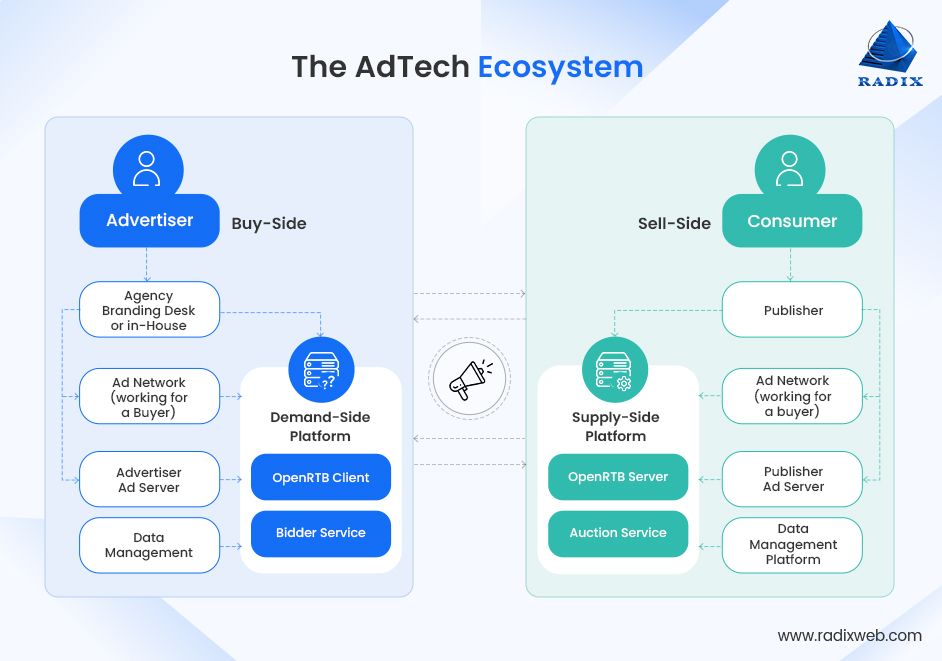
Different entities facilitate the relationship between media buyers and digital media owners, making it appear complex at first. However, a closer look at each component or feature in the ad technology ecosystem can clarify the big picture.
1. Ad Network: Connects advertisers with publishers for ad space.
2. Agency Trade Desk: Agency unit using programmatic tech for ad buying.
3. Content Delivery Network (CDN): Globally distributed servers for faster content delivery.
4. Ad Server: Manages ad display, storage, and tracking.
5. Data Management Platform: Organizes and analyzes data for targeted advertising.
Must-Have Features of a Successful AdTech Platform
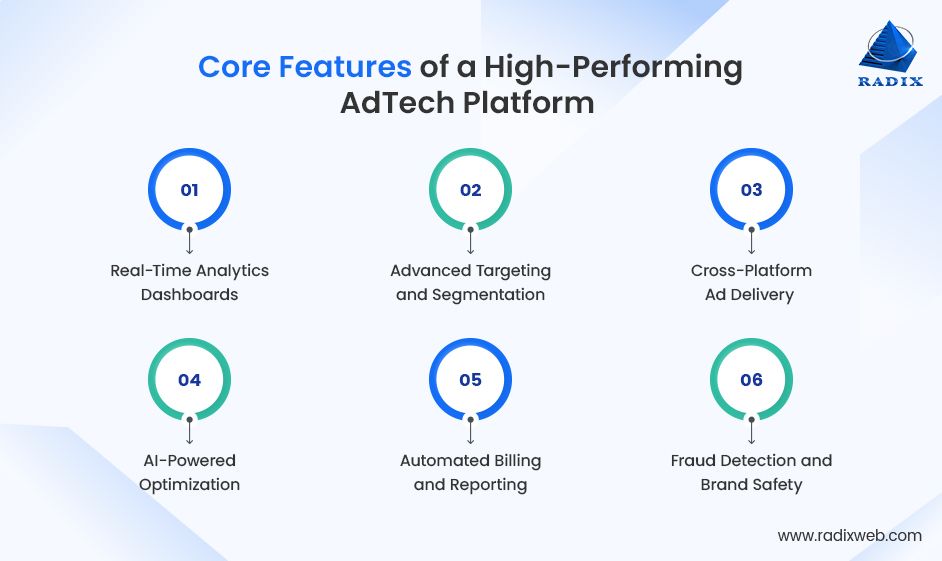
Modern AdTech solutions should deliver transparency, real-time intelligence, and performance. Following are the key feature we always prioritize integrating when building AdTech software to improve efficiency and maintains a competitive edge:
- Real-Time Analytics Dashboards – Provides actionable insights on click-through rates, impressions, and campaign ROI.
- Advanced Targeting and Segmentation – Helps with geo-targeting, contextual, and behavioral patterns to optimize ad relevance.
- Cross-Platform Ad Delivery - Manage multiple campaigns across DOOH, CTV, mobile, web, and social channels.
- AI-Powered Optimization – Integrates predictive algorithms to increase conversions and reduce wasted expenditure.
- Automated Billing and Reporting - Helps with transparent and simplified financial workflows.
- Fraud Detection and Brand Safety – Comes with AI-driven error detection to ensure clean ad inventory.
Five Major Benefits to Harness with AdTech Software Development
Planning your software development project for AdTech beforehand by seeking a seasoned development team and defining core objectives can let you optimally achieve the below-listed benefits.
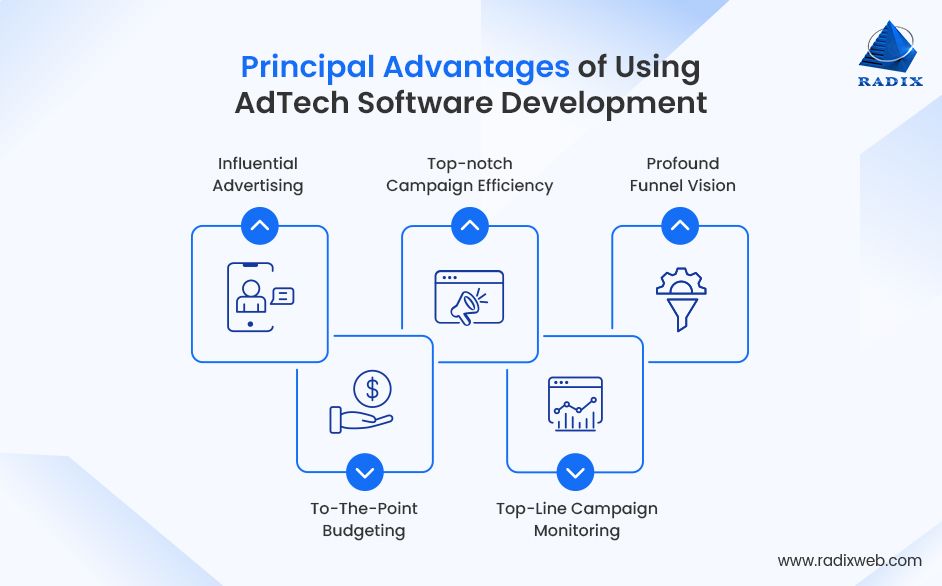
1. Influential Advertising: Developing AdTech software ensures that appealing content is delivered to the desired audience, thus promoting engagements among others.
2. Top-notch Campaign Efficiency: Developing targeted AdTech software improves marketing campaigns as it offers a vantage point for betterment.
3. Profound Funnel Vision: AdTech software offers the ability for targeted data-driven storytelling tailored to a person’s placement within the marketing funnel.
4. To-The-Point Budgeting: Developing AdTech solutions offers proper budgeting based on reliable insights that help raise the conversion rate.
5. Top-Line Campaign Monitoring: AdTech software development enables improved tracking and monitoring to enable effective ad placement with better performance.
Additionally, AdTech software offers you benefits like cross-platform consistency and insights on buyer’s journey.
Key Components of AdTech Solutions
Every successful AdTech landscape depends on an interconnected ecosystem of components that ensures ROI-based decision-making, transparency, and efficiency. The core components of AdTech platforms include:
- Supply-Side Platforms (SSPs) - Helps publishers handle, monetize, and optimize inventory for the best possible results.
- Demand-Side Platforms (DSPs) - Empower advertisers to optimize targeting, automate media buying, and conduct real-time bidding across multiple platforms.
- Data Management Platforms (DMPs) - Gather, store, and assess huge datasets to help with data-driven audience segmentation.
- Ad Exchanges – Serves as dynamic marketplaces, closing the gap between sellers and buyers.
- Ad Servers - Deliver, monitor, and evaluate cross-channel advertising performance across different platforms.
When combined, these key components merge to build an AdTech platform that powers precise audience targeting, cross-channel campaign optimization, and programmatic advertising. At Radixweb, our AdTech developers design a cohesive environment that smoothly integrates these modules, which helps improve data integrity, real-time bidding performance, and scalability.
Six Types of AdTech Software You Can Consider While Development
There are different types of AdTech software you can develop, but the choice regarding it depends on your business requirements. And software project estimation could be one of the best ways to decide on it as it helps you with need analysis, project defining, requirement detailing, and more so you can choose the ideal AdTech software type for your organization.
1. AI AdTech: The analytics from the Artificial Intelligence AdTech uses algorithms to determine the right types of messages for different customers. Messages are based on the information collected about the customers. AI model integration also helps know what ads can bring the intended results to a particular target audience.
2. Automated Bidding AdTech: Real-time bidding conducted automatically regarding ad space offers immediate response, elimination of manual operations and improved pace and precision regarding a campaign.
3. Mobile AdTech: This AdTech software approaches things using a mobile-first approach allowing for more precise campaigning towards mobile users, behavioral tracking and improved experiences for customers on a personal level.
4. Digital AdTech: Optimizing digital ads through campaigns by AdTech software allows advertisers to implement their digital marketing strategy effectively and exactly.
5. Video AdTech: It enables targeted, customized advertising among video streamers aimed at a selective audience, which provides a distinctive experience for prospective consumers.
6. Customer Data Platforms: CDPs gather and give insightful intelligence into customers’ needs, demands, likes and dislikes, which in turn formulate precision-oriented programs for marketing campaigns.
Real-Time Use Cases of AdTech Software
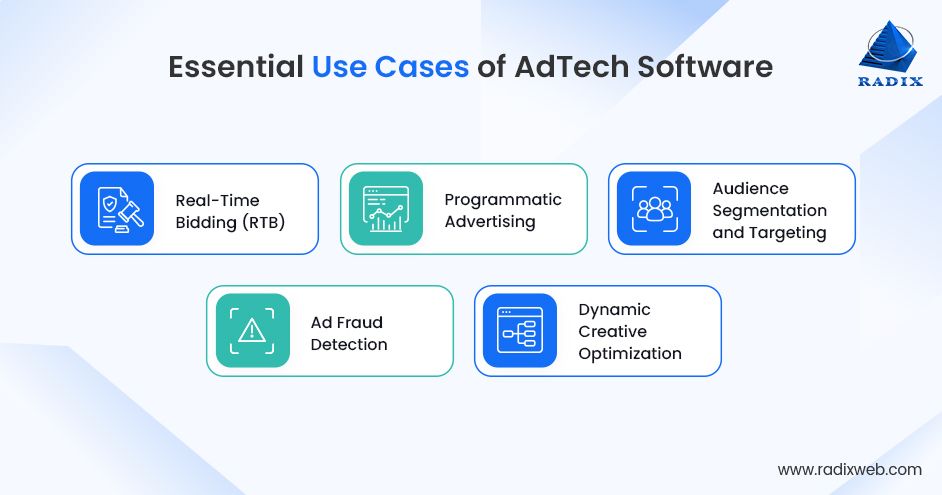
AdTech solutions are revolutionizing the way organizations can interact with audiences across multiple channels – delivering data-driven, highly-personalized experiences within milliseconds. Following are some real-time AdTech use cases that accelerates marketing campaigns:
- Real-Time Bidding (RTB) - Bids instantly as soon as the page loads—enabling cost-efficient ad placements.
- Programmatic Advertising - Automates ad purchase with machine learning and AI models to provide the right ad, to the right audience, at the right time.
- Audience Segmentation and Targeting – Deploys geolocation, contextual, and behavioral data to tailor ad delivery.
- Ad Fraud Detection - Use blockchain and predictive analytics to detect fraud clicks and impressions.
- Dynamic Creative Optimization (DCO) - Customize ad creatives instantly based on engagement patterns and user data.
Custom AdTech Software Development: Step-by-Step Process
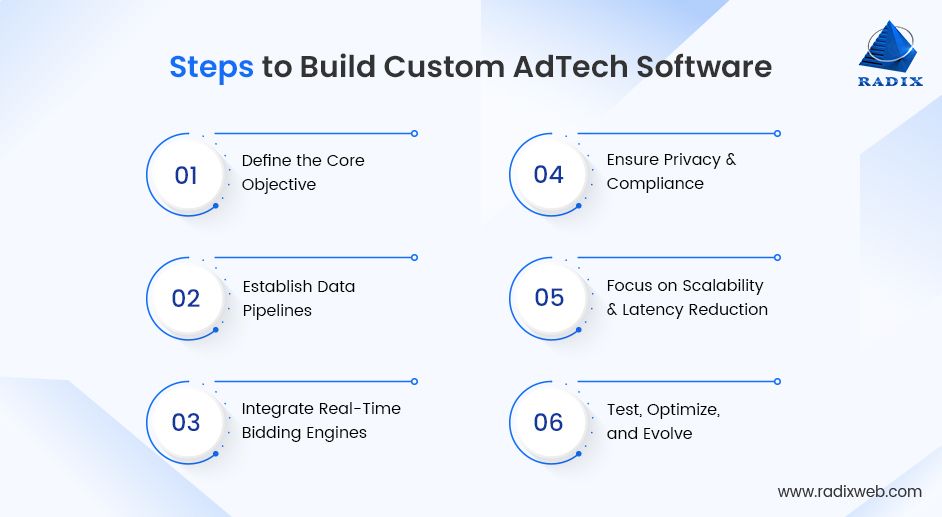
For successful AdTech platform development, you need to follow a strategic process, the ideal tech stack, and in-depth industry knowledge. Following is the software development process our experts follow for building custom AdTech solutions successfully:
Step.1: Define the Core Objective
We first identify whether your platform will serve ad agencies, publishers, or advertisers; each comes with unique value propositions.
Step.2: Establish Data Pipelines
Our experts then build integrations for visualization, processing, and data ingestion using flexible cloud architectures.
Step.3: Integrate Real-Time Bidding Engines
Here, we deploy RTB functionalities to improve ad trading automation and pricing effectiveness.
Step.4: Ensure Privacy and Compliance
We then develop software systems compliant with IAB, CCPA, and GDPR standards to maintain trust and data ethics.
Step.5: Focus on Scalability and Latency Reduction
In this step, we deploy edge computing and microservices for high-speed ad delivery.
Step.6: Test, Optimize, and Evolve
Finally, we conduct performance analytics, AI-driven optimization, and A/B testing for continuous improvement.
In short, AdTech software development process involves defining business objectives, developing secure data pipelines, enabling RTB, ensuring compliance, optimizing for scalability, and continuous performance testing.
AdTech Software Development: Three Challenges You Must Navigate
Navigating through the complicated world of AdTech software development presents numerous challenges which necessitate strategic fixes. Hiring a team of dedicated developers would be a primary solution to address such challenges and lock-in profit margins and revenue growth for your business.
1. Privacy Concerns and Regulations
Concerns about privacy and data security, particularly on third-party cookies, continue to dominate AdTech conversations. The delay in removing third-party cookies by Google until 2024 has made some people question whether ad targeting capabilities are real. The potential solution could be adjusting for a cookie-less future – marketers should grow first-party data, use cookie-less signals such as device IDs and cooperate with programmatic ad experts.
2. Transparency Mishaps
Lack of visibility into cost structures, cost mechanisms, and transactional flows hinders transparency within the digital advertising ecosystem. The transparency issue may cause ineffectiveness, ad fraud and, finally the decreasing credibility of the entire marketplace. However, to ensure that real change takes place, AdTech platforms need to merge and reduce costs, while companies should be more transparent on fees, traffic, and quality.
3. Ad Fraud and Brand Safety
The presence of fake impressions and bot traffic contributes to the persistence of ad fraud in the quality of the ads that lack transparency. Such practices are predicted to cost advertisers $100 billion worldwide. To safeguard themselves from this criminal activity, advertisers ought to select DSPs and SSPs with clear operations, track their analytics for fraud detection purposes, and insist on best practices from advertising partners, including proven ad fraud protection services.
While these were the three major challenges you had to navigate; there are a few other issues, such as low CTR and staggering contextual advertising that you might face.
Technology Stack for AdTech Software Development
Choosing the ideal technology stack is significant for long-term scalability, flexibility, and performance. Here’s an overview of the best tools, technologies, and frameworks for AdTech software development:
- Programming Languages – Node.js, Golang, Python, and Java for backend development.
- Data Processing Frameworks – Flink, Spark, and Apache Kafka for real-time analytics and data streaming.
- Cloud Platforms – Azure, Google Cloud, and AWS for microservice orchestration and scalable hosting.
- Databases – Redis, MongoDB, and Cassandra for high-speed data storage and retrieval.
- Security and Compliance – SSL, JWT, and OAuth 2.0 for secure data transactions.
- Machine Learning Libraries - PyTorch and TensorFlow for personalization and predictive analytics.
Radixweb’s expert AdTech developers integrate cutting-edge technologies with a time-tested architectural model to create robust, data-driven advertising environments that deliver accuracy and profit.
How Much Does It Cost to Build AdTech Software?
When it comes to AdTech software development, the cost can vary significantly based on factors such as complexity, integrated features, and the chosen tech stack. On average, developing an AdTech platform can cost anywhere between USD 80,000 and USD 300,000, and even more, depending mainly on the scale, scope, and required integration.
Key Factors Impacting AdTech Development Cost
- Feature Set and Complexity - The more advanced features you integrate, including AI-based audience segmentation, cross-channel attribution, or fraud detection, can further increase the cost.
- Technology Stack - Choosing the ideal data storage, RTB, and cloud infrastructure frameworks can considerably influence the overall software development cost and scalability.
- Integrations and APIs – Most of the time, AdTech solutions need to be integrated with payment systems, analytics tools, and third-party ad networks, which adds to development time and cost.
- Design and User Experience - A user-friendly analytics interface and dashboard improve usability but may require additional UI/UX investment.
- Team Expertise and Location – Collaborating with an expert AdTech development company ensures higher cost efficiency and optimal architecture. Our seasoned developers deploy time-tested frameworks and design models.
AdTech Software Development Cost Breakdown
| Software Complexity | Estimated Cost | Development Timeline | Key Features |
|---|---|---|---|
| Basic/MVP AdTech Software | USD 60,000 – USD 100,000 | 3-5 months | Real-time bidding (RTB), basic campaign management, core ad serving engine |
| Mid-Complex custom AdTech Solution | USD 120,000 – USD 180,000 | 5–8 months | Fraud detection and analytics, automated campaign optimization, advanced targeting, and segmentation |
| Advanced AdTech Ecosystem | USD 200,000 – USD 350,000+ | 8–12+ months | Cross-platform data management, AI/ML-driven recommendations, high availability, and scalability architecture |
The Future of Building AdTech Software: Top Trends
The AdTech landscape is very dynamic and is spurred with trends that promise to reshape the future of Adtech software development. These trends also act as guide for the stakeholders across the stages of software development lifecycle for managing the rapidly evolving digital advertising ecosystem. Check them out -
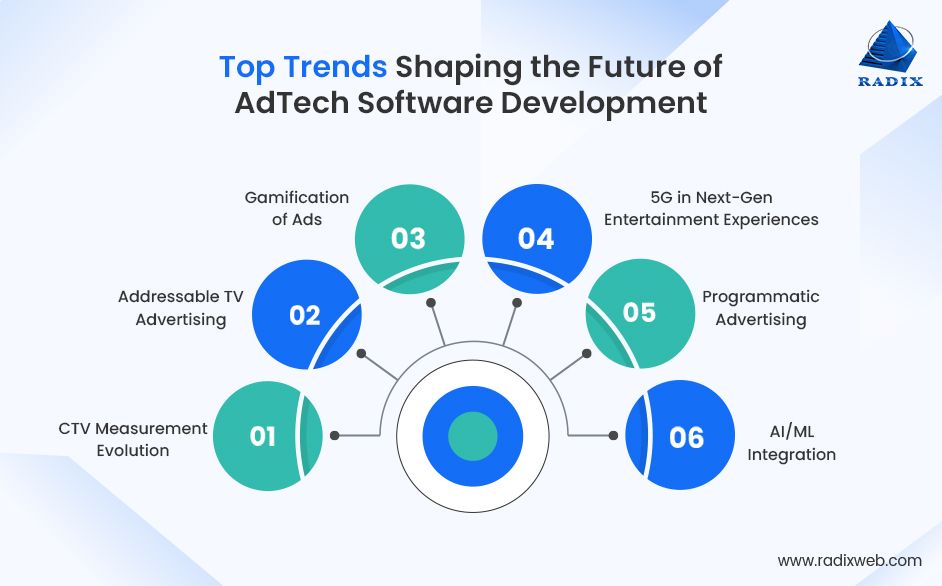
1. CTV Measurement Evolution
The CTV ad spending is bound to rise from $14.11 billion to $18.29 billion by the end of 2024. Based on predictions, there will also be a rise in CTV ad spending with streaming giants like Netflix and Disney+ introducing ad-supported tiers making available ad inventory grow. Moreover, machine learning-based creative optimization may increase profitability rates for CTV advertising due to intelligent engines offering appropriate music, visuals or messaging strategies for tailored, engaging videos.
2. Addressable TV Advertising
This trend allows for precise ad segmenting and targeting to the right target audience, unlike linear TV advertising. It provides more reach and brand recognition, offers advertisers precise statistics about engagement and conversions. According to a recent study of 350 advertising executives, over 80% of them were extremely happy with their addressable TV projects. Furthermore, with innovations such as Web 3.0 and the promise of shared experiences across multiple platforms for users, personalized ads can have an even wider reach.
3. Gamification of Ads
The inclusion of game elements in advertisements is a burgeoning trend with much potential in the AdTech field. This way, consumers can take part in small games instead of just watching an advertisement passively and receive rewards like discounts. It should be noted that this strategy will also encourage customer interaction and higher conversion rates at targeted customers’ costs.
4. 5G in Next-Gen Entertainment Experiences
Media and entertainment are witnessing digital transformation on a large-scale with 5G, AR, and VR. What 5G offers the market is bandwidth and latency that can support many use cases like hologram displays or holographic based marketing. Another function which may be enhanced using 5G is hyper-personalization through media design. When used alongside AI/ML, it can enable media planners along with advertisers to show ads to specific segments thus maximizing their effectiveness.
5. Programmatic Advertising
It involves the automated purchase of advertising inventory as opposed to manual methods typically used in digital advertising. Algorithms and data insights are employed by this technology to deliver ads to relevant users at the best time at the right price instead of manually selecting. With programmatic media buying publishers’ inventory fill rate improves, thereby ensuring better utilization of ad spaces.
6. AI/ML Integration
Advertisers are increasingly using Artificial Intelligence services to analyze user responses to ads such as gauging dwell time, facial expressions, scroll depth, etc., which helps in measuring the level of engagement by users and their feelings about the content. This becomes more relevant in an environment where third-party cookies are disappearing, making it more flexible for publishers and marketers. Therefore, AI helps to create accurate advertisements, anticipate demand, determine dynamic scenarios, predict customer behavior, and optimize budget allocation across channels.
These are just the top future trends that would influence AdTech software development. A few others could also include supply chain optimization, Digital Out of Home (DOOH), single currency ad delivery, and customer data platforms.
Conquer the Market with Radixweb: Your AdTech Software Development CompanyIn the AdTech world where every click matters, Radixweb is the trailblazer leading your brand to take over the market. Allow us to provide an additional impetus for your advertising campaigns in the pursuit of clear and effective communication with your intended audience. Supercharge your AdTech strategy by opting for a broad spectrum of innovative custom software development services that promise to optimize your organizational growth.We have cutting-edge technology, and we stand at par with what’s in vogue – like AI advancements and overcoming the cookie-less environment. Our seasoned developers provide your brand with the requisite skills in supply chain optimization, programmatic adoption, and DOOH resilience to steer the AdTech waters. Contact us now and become the king of the marketplace in style!
FAQs
What is the value of the AdTech software industry?
What is an example of AdTech?
What is MarTech Vs Adtech?
How does AdTech work?
How can AI enhance the performance of AdTech platforms?
How can custom AdTech software give my business a competitive edge?
Who are the leading players of AdTech software?
Ready to brush up on something new? We've got more to read right this way.

